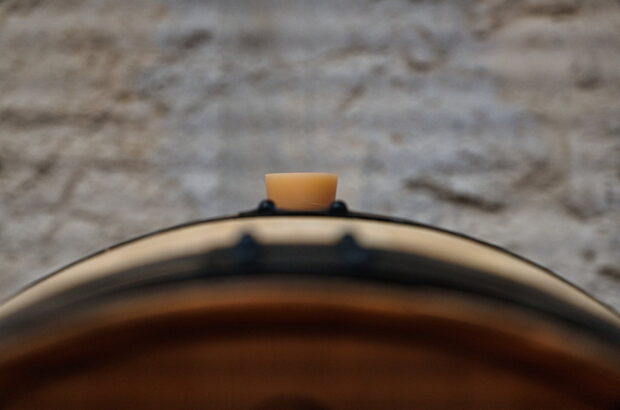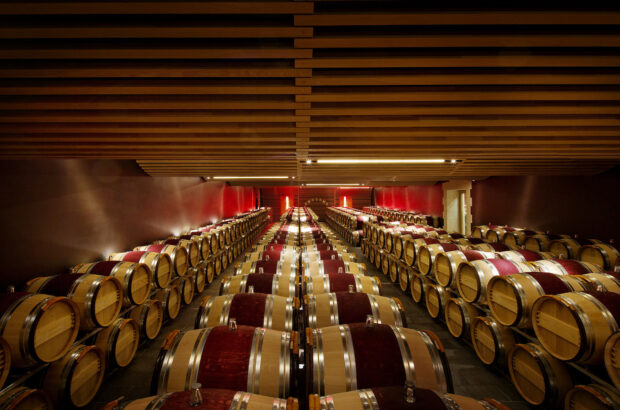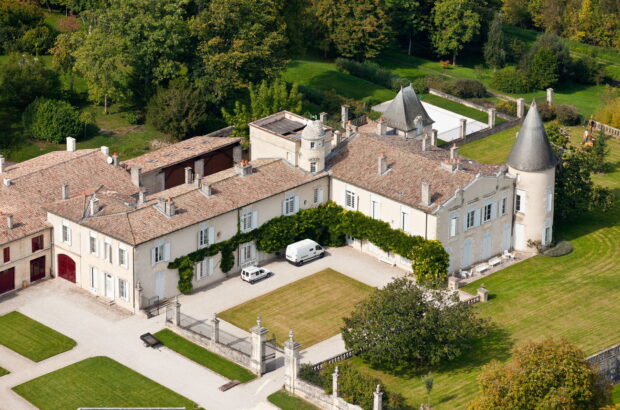Cognac was made by the blenders. Through their international connections and commercial nous, the merchants created a global powerhouse that remains dominated by their family names to this day: Jas Hennessy, Jean Martell, Rémy Martin, Emmanuel Courvoisier.
Brand power has been the key to Cognac’s success, but has something been lost along the way? At a time when we yearn to know more about where our food and drink comes from, and how it is made, might VSOP and XO blends appear anonymous – soulless even? But not all Cognacs are made this way. For a number of quality-focused houses, the land is absolutely central to what they do.
Scroll down for Woodard’s tasting notes for eight terroir-driven Cognacs to try
Nowhere is this more obvious than at Frapin, which produces all its Cognacs from its own vines, and doesn’t make anything for anyone else. Frapin’s Château de Fontpinot property, with its 240ha of vineyards, sits in the lap of the Grande Champagne ‘cru’ sub-region, where the sponge-like chalk soils allow the vines to delve down 10m in search of water and nutrients.
{"content":"PHA+PGltZyBmZXRjaHByaW9yaXR5PSJoaWdoIiBkZWNvZGluZz0iYXN5bmMiIGNsYXNzPSJsYXp5bG9hZCBibHVyLXVwIHNpemUtbWVkaXVtIHdwLWltYWdlLTQ2ODQ1MCBhbGlnbmNlbnRlciIgZGF0YS1wcm9jZXNzZWQgc3JjPSJodHRwczovL3d3dy5kZWNhbnRlci5jb20vd3AtY29udGVudC90aGVtZXMvc2ltYmEtdGhlbWUvYXNzZXRzL2ltYWdlcy9wbGFjZWhvbGRlci5wbmciIGRhdGEtc3JjPSJodHRwczovL2tleWFzc2V0cy50aW1laW5jdWsubmV0L2luc3BpcmV3cC9saXZlL3dwLWNvbnRlbnQvdXBsb2Fkcy9zaXRlcy8zNC8yMDIxLzEwL0NvZ25hYy1NQVAtMzAweDI5OC5wbmciIGFsdD0iIiB3aWR0aD0iMzAwIiBoZWlnaHQ9IjI5OCIgZGF0YS1zaXplcz0iYXV0byIgZGF0YS1zcmNzZXQ9Imh0dHBzOi8va2V5YXNzZXRzLnRpbWVpbmN1ay5uZXQvaW5zcGlyZXdwL2xpdmUvd3AtY29udGVudC91cGxvYWRzL3NpdGVzLzM0LzIwMjEvMTAvQ29nbmFjLU1BUC0zMDB4Mjk4LnBuZyAzMDB3LCBodHRwczovL2tleWFzc2V0cy50aW1laW5jdWsubmV0L2luc3BpcmV3cC9saXZlL3dwLWNvbnRlbnQvdXBsb2Fkcy9zaXRlcy8zNC8yMDIxLzEwL0NvZ25hYy1NQVAtNjMweDYyNS5wbmcgNjMwdywgaHR0cHM6Ly9rZXlhc3NldHMudGltZWluY3VrLm5ldC9pbnNwaXJld3AvbGl2ZS93cC1jb250ZW50L3VwbG9hZHMvc2l0ZXMvMzQvMjAyMS8xMC9Db2duYWMtTUFQLTEzNXgxMzUucG5nIDEzNXcsIGh0dHBzOi8va2V5YXNzZXRzLnRpbWVpbmN1ay5uZXQvaW5zcGlyZXdwL2xpdmUvd3AtY29udGVudC91cGxvYWRzL3NpdGVzLzM0LzIwMjEvMTAvQ29nbmFjLU1BUC0zMjB4MzE3LnBuZyAzMjB3LCBodHRwczovL2tleWFzc2V0cy50aW1laW5jdWsubmV0L2luc3BpcmV3cC9saXZlL3dwLWNvbnRlbnQvdXBsb2Fkcy9zaXRlcy8zNC8yMDIxLzEwL0NvZ25hYy1NQVAtNjIweDYxNS5wbmcgNjIwdywgaHR0cHM6Ly9rZXlhc3NldHMudGltZWluY3VrLm5ldC9pbnNwaXJld3AvbGl2ZS93cC1jb250ZW50L3VwbG9hZHMvc2l0ZXMvMzQvMjAyMS8xMC9Db2duYWMtTUFQLTkyMHg5MTIucG5nIDkyMHcsIGh0dHBzOi8va2V5YXNzZXRzLnRpbWVpbmN1ay5uZXQvaW5zcGlyZXdwL2xpdmUvd3AtY29udGVudC91cGxvYWRzL3NpdGVzLzM0LzIwMjEvMTAvQ29nbmFjLU1BUC5wbmcgMTIwMHciIHNpemVzPSIobWF4LXdpZHRoOiAzMDBweCkgMTAwdncsIDMwMHB4IiAvPlRoZSBob3VzZeKAmXMgQ2jDonRlYXUgRm9udHBpbm90IFhPIGFuZCBpdHMgdmludGFnZSBib3R0bGluZ3MgZXBpdG9taXNlIHRoaXMgYXBwcm9hY2gsIHdpdGggYWxsIHRoZSBwcm9jZXNzZXMgdGFraW5nIHBsYWNlIG9uIHRoZSBwcm9wZXJ0eSwgZnJvbSBwaWNraW5nIHRoZSBncmFwZXMgdG8gYm90dGxpbmcgdGhlIG1hdHVyZSBDb2duYWNzLCB3aGljaCBjb21iaW5lIGV4dHJhb3JkaW5hcnkgZmluZXNzZSB3aXRoIHVuZGVyc3RhdGVkIHBvd2VyLiBMb29rIG91dCBmb3IgdGhlIGltbWluZW50IHJlbGVhc2Ugb2YgYSBGcmFwaW4gMTk4OSB2aW50YWdlLCBhZ2VkIGZvciAzMCB5ZWFycywgYXMgd2VsbCBhcyB0aGUgdWx0cmEtaGlnaC1lbmQgQ3V2w6llIFJhYmVsYWlzLCB3aGljaCBpcyBibGVuZGVkIGZyb20gdGhlIG9sZGVzdCBlYXV4LWRlLXZpZSBbaW5kaXZpZHVhbCBkaXN0aWxsZWQgc3Bpcml0c10gaW4gRnJhcGlu4oCZcyDigJhwYXJhZGlz4oCZIGNlbGxhcnMuPC9wPgo8cD5BdCBmaXJzdCBnbGFuY2UsIDxzdHJvbmc+PGEgaHJlZj0iaHR0cHM6Ly93d3cuZGVsYW1haW4tY29nbmFjLmNvbS8iIHRhcmdldD0iX2JsYW5rIiByZWw9Im5vZm9sbG93IG5vb3BlbmVyIG5vcmVmZXJyZXIiPkRlbGFtYWluPC9hPjwvc3Ryb25nPuKAmXMgcHJvdmVuYW5jZSBjcmVkZW50aWFscyBtYXkgYXBwZWFyIGR1YmlvdXMuIFRoaXMgaXMgdGhlIHF1aW50ZXNzZW50aWFsIG7DqWdvY2lhbnQsIGJsZW5kaW5nIGFuZCBib3R0bGluZyBlYXV4LWRlLXZpZSwgd2l0aCBubyB2aW5leWFyZHMgb2YgaXRzIG93bi4gQnV0IHRoYXQgd2FzbuKAmXQgYWx3YXlzIHRoZSBjYXNlOiB0aGUgZmFtaWx5IG9ubHkgbGVmdCBmYXJtaW5nIGJlaGluZCBpbiAxOTEwLjwvcD4KPHA+PGRpdiBjbGFzcz0iYWQtY29udGFpbmVyIGFkLWNvbnRhaW5lci0tbW9iaWxlIj48ZGl2IGlkPSJwb3N0LWlubGluZS0yIiBjbGFzcz0iaXBjLWFkdmVydCI+PC9kaXY+PC9kaXY+PC9wPgo8cD5Ob3csIG1vcmUgdGhhbiBhIGNlbnR1cnkgbGF0ZXIsIGl0IGhhcyByZXR1cm5lZCB0byBtYW5hZ2UgMjBoYSBvZiB2aW5lcyBhdCBCZWxsZXZpZ25lIGluIEdyYW5kZSBDaGFtcGFnbmUuIEFuZCBEZWxhbWFpbiBoYXMgY2VtZW50ZWQgdGhpcyByZW5ld2VkIGZvY3VzIG9uIHRoZSBsYW5kIHdpdGggaXRzIFBsw6lpYWRlIENvbGxlY3Rpb246IGFubnVhbCByZWxlYXNlcyBvZiBzaW5nbGUtY2Fzaywgb2Z0ZW4gc2luZ2xlLXZpbmV5YXJkIENvZ25hY3MgYmVhcmluZyB0aGUgbmFtZXMgb2YgaGFtbGV0cyBhbmQgY29tbXVuZXMg4oCTIEJvbm5ldWlsLCBBbWJsZXZpbGxlLCBCb3V0ZXZpbGxlIOKAkyB0aGF0IG1heSBub3QgYmUgZmFtaWxpYXIgbm93LCBidXQgY291bGQgb25lIGRheSBiZSBhcyB3ZWxsLWtub3duIGFzIEFtYm9ubmF5IG9yIExlIE1lc25pbC1zdXItT2dlciBpbiA8c3Ryb25nPjxhIGhyZWY9Imh0dHBzOi8vd3d3LmRlY2FudGVyLmNvbS93aW5lL3dpbmUtcmVnaW9ucy9jaGFtcGFnbmUvIiB0YXJnZXQ9Il9ibGFuayIgcmVsPSJub2ZvbGxvdyBub29wZW5lciBub3JlZmVycmVyIj5DaGFtcGFnbmU8L2E+PC9zdHJvbmc+LjwvcD4KPHA+UGljdHVyZXNxdWUgQm9ubmV1aWwsIHdpdGggaXRzIHJvbGxpbmcsIGNoYWxrLWZsZWNrZWQgcm93cyBvZiB2aW5lcywgaGFzIGFscmVhZHkgZWRnZWQgaW50byB0aGUgc3BvdGxpZ2h0LCB0aGFua3MgdG8gPHN0cm9uZz48YSBocmVmPSJodHRwOi8vd3d3LmhpbmVjb2duYWMuY29tLyIgdGFyZ2V0PSJfYmxhbmsiIHJlbD0ibm9mb2xsb3cgbm9vcGVuZXIgbm9yZWZlcnJlciI+SGluZTwvYT48L3N0cm9uZz4uIFRoZSBEb21haW5lcyBIaW5lIGJvdHRsaW5ncyBmcm9tIGl0cyA4MGhhIGVzdGF0ZSBpbiBCb25uZXVpbCBhcmUgYW4gZXhlcmNpc2UgaW4gdGhlIGV4cG9zaXRpb24gb2YgdGVycm9pciB0aHJvdWdoIENvZ25hYzogc2luZ2xlLXZpbnRhZ2UsIGFnZWQgZm9yIGxlc3MgdGhhbiBhIGRlY2FkZSwgd2l0aCBhIGxpZ2h0IHRvdWNoIGluIHRoZSBjZWxsYXIgYWxsb3dpbmcgdGhlIGRpc3RpbGxhdGUgdG8gc2hpbmUuPC9wPgo8cD7igJhXZSB3YW50IHRvIHNob3cgd2hhdCB0aGUgdmluZXlhcmQgZG9lcyBpbiBhbnkgeWVhciDigJMgcmVhbGx5IGNsb3NlciB0byB3aW5lIHRoYW4gdG8gdGhlIGNvbnZlbnRpb25hbCBpZGVhIG9mIENvZ25hYyzigJkgc2F5cyBjZWxsYXIgbWFzdGVyIEVyaWMgRm9yZ2V0LiBUaGVzZSBlbGVnYW50LCBkZWxpY2F0ZSBDb2duYWNzIHNob3cgYWxsIHRoZSBmbG9yYWwgdGVuc2lvbiBvZiBHcmFuZGUgQ2hhbXBhZ25lLjwvcD4KPGRpdiBjbGFzcz0iYWQtY29udGFpbmVyIGFkLWNvbnRhaW5lci0tbW9iaWxlIj48ZGl2IGlkPSJwb3N0LWlubGluZS0zIiBjbGFzcz0iaXBjLWFkdmVydCI+PC9kaXY+PC9kaXY+CjxkaXYgaWQ9ImF0dGFjaG1lbnRfNDY3NjgxIiBzdHlsZT0id2lkdGg6IDEzMTBweCIgY2xhc3M9IndwLWNhcHRpb24gYWxpZ25ub25lIj48aW1nIGRlY29kaW5nPSJhc3luYyIgYXJpYS1kZXNjcmliZWRieT0iY2FwdGlvbi1hdHRhY2htZW50LTQ2NzY4MSIgY2xhc3M9Imxhenlsb2FkIGJsdXItdXAgc2l6ZS1mdWxsIHdwLWltYWdlLTQ2NzY4MSIgZGF0YS1wcm9jZXNzZWQgc3JjPSJodHRwczovL3d3dy5kZWNhbnRlci5jb20vd3AtY29udGVudC90aGVtZXMvc2ltYmEtdGhlbWUvYXNzZXRzL2ltYWdlcy9wbGFjZWhvbGRlci5wbmciIGRhdGEtc3JjPSJodHRwczovL2tleWFzc2V0cy50aW1laW5jdWsubmV0L2luc3BpcmV3cC9saXZlL3dwLWNvbnRlbnQvdXBsb2Fkcy9zaXRlcy8zNC8yMDIxLzEwL0NvZ25hYy1EZWxhbWFpbi1CZWxsZXZpZ25lLXZpbmV5YXJkLmpwZyIgYWx0PSJDb2duYWMgRGVsYW1haW4gQmVsbGV2aWduZSB2aW5leWFyZCIgd2lkdGg9IjEzMDAiIGhlaWdodD0iODYwIiBkYXRhLXNpemVzPSJhdXRvIiBkYXRhLXNyY3NldD0iaHR0cHM6Ly9rZXlhc3NldHMudGltZWluY3VrLm5ldC9pbnNwaXJld3AvbGl2ZS93cC1jb250ZW50L3VwbG9hZHMvc2l0ZXMvMzQvMjAyMS8xMC9Db2duYWMtRGVsYW1haW4tQmVsbGV2aWduZS12aW5leWFyZC5qcGcgMTMwMHcsIGh0dHBzOi8va2V5YXNzZXRzLnRpbWVpbmN1ay5uZXQvaW5zcGlyZXdwL2xpdmUvd3AtY29udGVudC91cGxvYWRzL3NpdGVzLzM0LzIwMjEvMTAvQ29nbmFjLURlbGFtYWluLUJlbGxldmlnbmUtdmluZXlhcmQtMzAweDE5OC5qcGcgMzAwdywgaHR0cHM6Ly9rZXlhc3NldHMudGltZWluY3VrLm5ldC9pbnNwaXJld3AvbGl2ZS93cC1jb250ZW50L3VwbG9hZHMvc2l0ZXMvMzQvMjAyMS8xMC9Db2duYWMtRGVsYW1haW4tQmVsbGV2aWduZS12aW5leWFyZC02MzB4NDE3LmpwZyA2MzB3LCBodHRwczovL2tleWFzc2V0cy50aW1laW5jdWsubmV0L2luc3BpcmV3cC9saXZlL3dwLWNvbnRlbnQvdXBsb2Fkcy9zaXRlcy8zNC8yMDIxLzEwL0NvZ25hYy1EZWxhbWFpbi1CZWxsZXZpZ25lLXZpbmV5YXJkLTEzNXg4OS5qcGcgMTM1dywgaHR0cHM6Ly9rZXlhc3NldHMudGltZWluY3VrLm5ldC9pbnNwaXJld3AvbGl2ZS93cC1jb250ZW50L3VwbG9hZHMvc2l0ZXMvMzQvMjAyMS8xMC9Db2duYWMtRGVsYW1haW4tQmVsbGV2aWduZS12aW5leWFyZC0zMjB4MjEyLmpwZyAzMjB3LCBodHRwczovL2tleWFzc2V0cy50aW1laW5jdWsubmV0L2luc3BpcmV3cC9saXZlL3dwLWNvbnRlbnQvdXBsb2Fkcy9zaXRlcy8zNC8yMDIxLzEwL0NvZ25hYy1EZWxhbWFpbi1CZWxsZXZpZ25lLXZpbmV5YXJkLTYyMHg0MTAuanBnIDYyMHcsIGh0dHBzOi8va2V5YXNzZXRzLnRpbWVpbmN1ay5uZXQvaW5zcGlyZXdwL2xpdmUvd3AtY29udGVudC91cGxvYWRzL3NpdGVzLzM0LzIwMjEvMTAvQ29nbmFjLURlbGFtYWluLUJlbGxldmlnbmUtdmluZXlhcmQtOTIweDYwOS5qcGcgOTIwdywgaHR0cHM6Ly9rZXlhc3NldHMudGltZWluY3VrLm5ldC9pbnNwaXJld3AvbGl2ZS93cC1jb250ZW50L3VwbG9hZHMvc2l0ZXMvMzQvMjAyMS8xMC9Db2duYWMtRGVsYW1haW4tQmVsbGV2aWduZS12aW5leWFyZC0xMjIweDgwNy5qcGcgMTIyMHciIHNpemVzPSIobWF4LXdpZHRoOiAxMzAwcHgpIDEwMHZ3LCAxMzAwcHgiIC8+PHAgaWQ9ImNhcHRpb24tYXR0YWNobWVudC00Njc2ODEiIGNsYXNzPSJ3cC1jYXB0aW9uLXRleHQiPlRoZSAyMGhhIEJlbGxldmlnbmUgdmluZXlhcmQgaW4gR3JhbmRlIENoYW1wYWduZSwgbWFuYWdlZCBieSBEZWxhbWFpbiBzaW5jZSAyMDE5PC9wPjwvZGl2Pgo8aDM+UmVnaW9uYWwgZGl2ZXJzaXR5PC9oMz4KPHA+T3RoZXJzIGhhdmUgZm9yZWdvbmUgQ29nbmFj4oCZcyBoZWFydGxhbmQgdG8gZXhwbG9yZSB0aGUgcmVnaW9u4oCZcyBodWdlIGRpdmVyc2l0eTogPHN0cm9uZz48YSBocmVmPSJodHRwczovL2NhbXVzLmZyLyIgdGFyZ2V0PSJfYmxhbmsiIHJlbD0ibm9mb2xsb3cgbm9vcGVuZXIgbm9yZWZlcnJlciI+Q2FtdXM8L2E+PC9zdHJvbmc+IGlzIHRoZSBsYXJnZXN0IGxhbmRvd25lciBpbiB0aGUgdGlueSBCb3JkZXJpZXMgZW5jbGF2ZSwgYW5kIGhhcyBtYWRlIGEgc3BlY2lhbGl0eSBvZiBpdHMgQm9yZGVyaWVzIFZTT1AgYW5kIFhPIGJvdHRsaW5ncy4gVGhlIGhvdXNlIGhhcyBhbHNvIHRhcHBlZCBDb2duYWPigJlzIGV4dHJlbWVzLCBmcm9tIHRoZSBtYXJpdGltZS1pbmZsdWVuY2VkIHZpbmV5YXJkcyBvbiB0aGUgQXRsYW50aWMtbGFwcGVkIElsZSBkZSBSw6kgaXNsYW5kLCB0byB0aGUgd2FybWVyIERvcmRvZ25lIGZvciBpdHMgU2FpbnQtQXVsYXllIGFuZCBSZXR1cm4gdG8gU2FpbnQtQXVsYXllIGJvdHRsaW5ncywgdmludGFnZSBDb2duYWNzIGNyZWF0ZWQgZnJvbSBDb2xvbWJhcmQgZ3JhcGVzLjwvcD4KPGRpdiBjbGFzcz0iYWQtY29udGFpbmVyIGFkLWNvbnRhaW5lci0tbW9iaWxlIj48ZGl2IGlkPSJwb3N0LWlubGluZS00IiBjbGFzcz0iaXBjLWFkdmVydCI+PC9kaXY+PC9kaXY+CjxwPlRoZXNlIHByb2R1Y3RzIGFyZSByZWxhdGl2ZWx5IHJhcmUg4oCTIHRoZSBDYW11cyBTYWludC1BdWxheWUgcmVsZWFzZXMgd2VyZSBvbmx5IDMsMDAwIGJvdHRsZXMgZWFjaCwgZm9yIGV4YW1wbGUg4oCTIGFuZCwgYWx0aG91Z2ggdGhleSBzaGluZSBhIGxpZ2h0IG9uIHRoZSBkaXZlcnNlIHRlcnJvaXIgb2YgdGhlIENvZ25hYyByZWdpb24sIGl04oCZcyBpbXBvcnRhbnQgdG8gcmVtZW1iZXIgdGhhdCB0aGV5IHJlbWFpbiBleGNlcHRpb25zIHRvIHRoZSBydWxlIG9mIGJsZW5kaW5nIGhlcmUuPC9wPgo8cD7igJhTaW5nbGUgdmluZXlhcmRzLCBzaW5nbGUgeWVhcnMsIHNpbmdsZSBjYXNrcyBhcmUgYWxsIGdyb3dpbmcgaW4gcG9wdWxhcml0eSwgd2hpY2ggc2l0cyBpbiBvcHBvc2l0aW9uIHRvIHRoZSBibGVuZGluZyB0cmFkaXRpb24sIGJ1dCB0aGVzZSBvcHBvcnR1bml0aWVzIG9ubHkgcmVhbGx5IGV4aXN0IGF0IHRoZSB1cHBlciBlbmQgb2Ygd2hhdCBuYXR1cmUgY2FuIG9mZmVyLOKAmSBwb2ludHMgb3V0IENoYXJsZXMgQnJhYXN0YWQsIERlbGFtYWluIG1hbmFnaW5nIGRpcmVjdG9yLjwvcD4KPGRpdiBjbGFzcz0iYWQtY29udGFpbmVyIGFkLWNvbnRhaW5lci0tbW9iaWxlIj48ZGl2IGlkPSJwb3N0LWlubGluZS01IiBjbGFzcz0iaXBjLWFkdmVydCI+PC9kaXY+PC9kaXY+CjxwPuKAmEFuIGVhdS1kZS12aWUgbXVzdCBiZSBpbm5hdGVseSBhIHF1aXRlIGV4dHJhb3JkaW5hcnkgdGhpbmcgdG8gcmVhY2ggYmV5b25kIGl0cyBwb3NzaWJpbGl0aWVzIGFzIHBhcnQgb2YgYSBibGVuZCBhbmQgbWVyaXQgZGVjYWRlcyBvZiBzdGFuZGFsb25lIHRyZWF0bWVudCBmcm9tIGEgY2VsbGFyIG1hc3Rlci7igJk8L3A+CjxoMz5UZXJyb2lyIGZvY3VzPC9oMz4KPHA+SXQgd291bGQgYWxzbyBiZSB1bmZhaXIgdG8gYWNjdXNlIHRoZSBiaWcgaG91c2VzIG9mIGVudGlyZWx5IGlnbm9yaW5nIHdoZXJlIHRoZWlyIENvZ25hY3MgY29tZSBmcm9tLiA8c3Ryb25nPjxhIGhyZWY9Imh0dHBzOi8vd3d3Lm1hcnRlbGwuY29tLyIgdGFyZ2V0PSJfYmxhbmsiIHJlbD0ibm9mb2xsb3cgbm9vcGVuZXIgbm9yZWZlcnJlciI+TWFydGVsbDwvYT48L3N0cm9uZz4gaGFzIGxvbmcgYmVlbiBhIGh1Z2UgZmFuIG9mIEJvcmRlcmllcyDigJMgc2hvd2Nhc2luZyB0aGUgY3J1aW5pdHMgQ29yZG9uQmxldSBleHByZXNzaW9uIGVzcGVjaWFsbHkuIE1lYW53aGlsZSwgdGhlIGhvdXNl4oCZcyByZWNlbnRseSBsYXVuY2hlZCBEYW1lLUplYW5uZSBDb2xsZWN0aW9uIGluY2x1ZGVkIGEgMTk3MSB2aW50YWdlIGZyb20gRmlucyBCb2lzLCB3aGljaCBpcyBub3QgYW4gYXJlYSBnZW5lcmFsbHkgc3lub255bW91cyB3aXRoIGxvbmcgYWdlaW5nIGFuZCB0aGUgaGlnaGVzdCBxdWFsaXR5LjwvcD4KPHA+4oCYQWxsIHRlcnJvaXJzIGNhbiBwcm9kdWNlIGV4Y2VwdGlvbmFsIENvZ25hY3Ms4oCZIGV4cGxhaW5zIE1hcnRlbGwgY2VsbGFyIG1hc3RlciBDaHJpc3RvcGhlIFZhbHRhdWQsIGhpZ2hsaWdodGluZyB0aHJlZSBrZXkgZmFjdG9yczogdGhlIGxvY2F0aW9uIGFuZCBzb2lsOyB0aGUgY2xpbWF0ZSBvZiBhIHBhcnRpY3VsYXIgeWVhcjsgYW5kIHRoZSBrbm93aG93IG9mIHRoZSBmYXJtZXIsIGRpc3RpbGxlciwgY29vcGVyIGFuZCBjZWxsYXIgbWFzdGVyLiDigJhUaGUgMTk3MSBNYXJ0ZWxsIENvZ25hYyBmcm9tIHRoZSBEYW1lLUplYW5uZSBDb2xsZWN0aW9uIGlzIGEgcGVyZmVjdCBleGFtcGxlIG9mIHRoaXMgcXVlc3QgZm9yIGV4Y2VsbGVuY2UsIHdoZXJlIHRoZSBjb21iaW5hdGlvbiBvZiB0aGVzZSB0aHJlZSBlbGVtZW50cyBtYWtlcyB0aGUgZWF1LWRlLXZpZSBzbyBzcGVjaWFsLuKAmTwvcD4KPHA+TWVhbndoaWxlLCA8c3Ryb25nPjxhIGhyZWY9Imh0dHBzOi8vd3d3Lmhlbm5lc3N5LmNvbS8iIHRhcmdldD0iX2JsYW5rIiByZWw9Im5vZm9sbG93IG5vb3BlbmVyIG5vcmVmZXJyZXIiPkhlbm5lc3N5PC9hPjwvc3Ryb25nPiBtYXN0ZXIgYmxlbmRlciBSZW5hdWQgRmlsbGlvdXggZGUgR2lyb25kZSBpcyByZXNwb25zaWJsZSBmb3IgbWFraW5nIHRoZSB3b3JsZOKAmXMgYmVzdC1zZWxsaW5nIENvZ25hYy4g4oCYWW91IGNvdWxkIHRoaW5rIHRoYXQgdGhpcyBpbXBvcnRhbmNlIG9mIHByb3ZlbmFuY2UgaXMgdGhlcmVmb3JlIGxlc3Ms4oCZIGhlIHNheXMuIOKAmEluIGZhY3QsIGl04oCZcyB0aGUgb3Bwb3NpdGU6IHdlIHRhc3RlIG1vcmUgdGhhbiAxMCwwMDAgc2FtcGxlcyBldmVyeSB5ZWFyIHRvIGFzc2VzcyB0aGUgcXVhbGl0eSBvZiBlYWNoIGJhdGNoLjwvcD4KPHA+4oCYV2UgZm9sbG93IHRoZSBxdWFsaXR5IGFjaGlldmVkIGJ5IGVhY2ggZ3JhcGUtZ3Jvd2VyLiBXZSBrbm93IHRoZW0sIHdoZXJlIHRoZXkgYXJlLCBob3cgdGhleSB3b3JrLiBXZSB3b3JrIGNvbnN0YW50bHkgd2l0aCB0aGVtIHRvIGltcHJvdmUgb3VyIGFiaWxpdHkgdG8gZ2V0IHRoZSBiZXN0IGZyb20gdGhlIHBvdGVudGlhbCBvZiB0aGVpciB2aW5leWFyZHMuPC9wPgo8cD7igJhBcyB0aGUgbWFzdGVyIGJsZW5kZXIs4oCZIEZpbGxpb3V4IGRlIEdpcm9uZGUgYWRkcywg4oCYbXkgam9iIGlzIHRoZW4gdG8gcHV0IHRvZ2V0aGVyIHRoZSBlYXV4LWRlLXZpZSB0byBnZXQgdGhlIGJlc3QgYmxlbmQgcG9zc2libGUuIEF0IEhlbm5lc3N5LCBmb3IgQ29nbmFjLW1ha2luZywg4oCccHJvdmVuYW5jZeKAnSBpcyBub3QgYSBkZXN0aW5hdGlvbiwgYnV0IHBhcnQgb2YgdGhlIGpvdXJuZXku4oCZPC9wPgo8cD4K"}
Cognacs with a sense of place: eight to try
Camus Single Estate Borderies VSOP
From the smallest Cognac cru comes this lovely example of its signature style, with plenty of restraint but charming perfumed fruit and a floral undertone, backed up by vanilla and spice. Alcohol 40%

Delamain Pléiade, Collection Révélation, Bonneuil
This is a very different Bonneuil Cognac to the Domaines Hine example: long-aged, with scents of vine flowers, some almost confected fruit – sweet cherry to the fore – and alluring notes of nutmeg and cinnamon. Alc 45%

Domaines Hine Bonneuil 2010
The fourth Hine Bonneuil release, this shows the development of the concept with a perfectly balanced, elegant and fruit- forward expression of the excellent 2010 harvest, with light spice from the oak and a nip of menthol. Alc 42.1%

Frapin Château Fontpinot XO
Frapin always treads a fine line between elegance, complexity and structure – and this benchmark expression is the perfect example. Hedgerow florals, creamy vanilla and an edge of spice and tannin from the cask. Alc 41%

Guillon-Painturaud Hors d’Age
This is a reliable, historic house (the Pineau is also superb) with formidable aged stocks and 18ha of prime Grande Champagne vineyards, put to good use here with a medium-weight, power- meets-finesse Cognac that’s seen about 30 summers. Alc 40%

Hennessy XO
The original XO, this is a Cognac in a traditional style – rich and decadent, with powerful cask influence – and which epitomises the art of blending: combining a bewildering array of eaux-de-vie to make them sing. Alc 40%

Martell Cordon Bleu
Of all of Martell’s Cognacs, Cordon Bleu brings the qualities of the Borderies cru to the fore, with its characteristic elegance overlaid onto seductive orchard fruits and sumptuous spiced vanilla. Alc 40%

Pierre Ferrand Sélection des Anges
From one of the most forward-thinking of Grande Champagne houses, decades in cask have left a velvet, seamless Cognac that melds dried flowers, plummy fruit, walnuts and dark honey. Alc 41.8%

You may also like




















